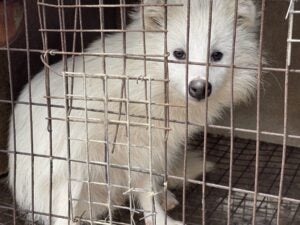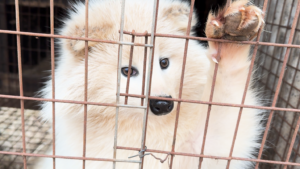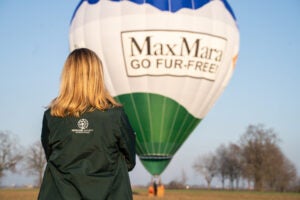
LONDON—Shocking new footage of animals suffering on fur farms in Finland—a country that supplies fur sold in the UK—reveals foxes with raw open wounds, weeping infected eyes and deformed splayed feet. The investigation, carried out in late October by leading animal protection organisation Humane Society International/UK in partnership with Finnish animal protection organisation Oikeutta Eläimille, also found zoonotic disease prevention measures being flouted on the fur farms visited, constituting an alarming public health risk. Investigators, who took biosecurity precautions, also filmed obese “monster foxes” with unnaturally excessive skin folds from selective breeding to increase their fur yield, and foxes displaying repetitive behaviours indicative of mental distress. The UK has allowed imports of more than £16 million of fur from Finland since 2000.
View photos and video. To download these visuals, email Sally Ivens: sivens@hsi.org.
Finland is one of the last remaining European countries in which farming animals for fur remains legal, with the Finnish trade boasting that almost 100% of its fox fur farms are certified by the SAGA scheme (including the WelFur protocol), a set of guidelines promulgated by the Finnish auction house SAGA, which promises “the highest level of animal welfare”. However, the horrifying conditions documented—including on SAGA-assured farms—show the heartbreaking reality of the industry: foxes confined in small, barren cages for their entire lives, never able to feel the grass beneath their feet nor carry out natural behaviours such as running, digging and hunting. Fox fur originating from Finland is used by brands such as Woolrich, Ermanno Scervino, Yves Salomon and Fendi and can be found in UK shops such as Harrods.
Claire Bass, senior director of campaigns and public affairs at Humane Society International/UK, said: “Finnish fur farms describe having animal welfare as ‘a top priority’ but this investigation tells a very different story. Forced to spend their entire lives in cages only a little bigger than their own bodies, many of the animals we saw were chronically stressed, others had diseased eyes and mouths and some had raw, clearly untreated injuries. In addition, we saw regulations designed to stop the spread of avian flu on fur farms flouted. I’ve visited around 20 fur farms in the past six years and from what I’ve witnessed on every occasion it’s clear that the fur trade routinely disregards both animal welfare and public health.
These appalling conditions are worlds apart from the ‘luxury’ image the fur trade tries to portray, and stores like Harrods should rethink having their brands anywhere near this indefensible suffering. We urge MPs and the UK Government to back Ruth Jones’ Bill to bring an end to Britain’s involvement in the cruel and dangerous fur trade.”
Singer-songwriter and animal advocate Will Young said “Fur is disgustingly cruel and it breaks my heart to see foxes and other animals suffering for this outdated ‘fashion’ product. I’m proud to be joining Humane Society International/UK in urging the Government to support Ruth Jones MP’s Bill to ban imports. We need a Fur Free Britain!”
Outbreaks of both COVID-19 and highly pathogenic avian influenza on more than 500 fur farms in Europe and North America have alarmed scientists and public health officials. Since the avian flu outbreaks on fur farms in Finland in 2023, where the original source of the infection was believed to have been wild gulls, the Finnish authorities have introduced biosecurity measures and mandatory carcass testing periods. They have also introduced regulations requiring the use of netting to prevent wild birds from accessing the housed animals’ cages and their food and drinking water; the netting is required to be checked regularly and any birds observed inside must be removed immediately. HSI/UK investigators found farms risking public health by flouting these rules. In many instances the netting failed to cover the full length of the cages and, on one farm, the decaying body of a wild gull was found just underneath a row of caged foxes.
Kristo Muurimaa of Oikeutta Eläimille said: “Finnish fur farms are a disease disaster waiting to happen. The cages are open to the elements and there’s no way to reliably prevent avian influenza or other possibly dangerous viruses from spreading. We urge the Finnish Government to follow the path of 21 other European countries and ban fur farming, supporting farmers where necessary to secure a rapid closure of this industry.”
Although fur farming has been banned in the UK on animal welfare grounds for over 20 years, this cruel and frivolous fashion product is still imported and sold here. HSI/UK estimates that the amount of fur imported into the UK over the five years 2019-2023 equates to approximately 7 million animals brutally killed.
HSI/UK leads the Fur Free Britain campaign for a ban on the import and sale of fur, which has gathered over 1.2 million petition signatures and support from a host of celebrities including Dame Judi Dench, Stella and Sir Paul McCartney, Leona Lewis OBE, Alesha Dixon and Strictly Come Dancing’s Pete Wicks.
In October 2024, Labour MP Ruth Jones introduced a Private Member’s Bill to prohibit the import and sale of fur; HSI/UK welcomed the tabling of this draft law as a significant step forward. The Bill proposes to extend existing bans on trade in fur from cats, dogs and seals to include foxes, raccoon dogs, mink, chinchilla, coyotes and other animals killed for fur fashion, and prevent the import and sale of new animal fur from all species. If passed into law, the ban would end the UK’s complicity in the cruelty and public health risk of the global fur trade.
Fur facts:
- Tens of millions of animals suffer and die each year in the global fur trade. The vast majority of animals killed for their fur are kept in barren battery cages on fur farms.
- In addition to the physical and psychological torment of being confined in small, barren cages for their entire lives, the methods typically used to kill animals on fur farms are equally distressing. Foxes are typically killed by anal electrocution and mink are gassed.
- The UK was the first country in the world to ban fur farming and since then an additional 21 European nations have banned the cruel practice—most recently Romania and Lithuania.
- HMRC records show that almost £40 million of fur (£39,703,694) was imported to the UK in 2023 from countries including Finland, China, Spain, Greece and Poland.
- During the 2023 outbreaks of avian influenza on Finnish fur farms, where mammal-to-mammal transmission was believed likely to have occurred, the Finnish authorities ordered all the animals on infected farms (around 500,000 mink, fox, raccoon dog and sable) to be killed on public health grounds.
- In a July 2023 article published in the scientific journal Proceedings of the National Academy of Sciences in July 2023, Professor Wendy Barclay and Dr Thomas Peacock of Imperial College London warned that fur farming poses a risk for the emergence of future disease outbreaks and should be considered in the same category of high-risk practices as the bushmeat trade and live animal markets. The PNAS article states that “fur farming takes place in a high-density animal environment that allows for rapid spread of viruses with pandemic potential—and for virus adaptation to animals that would be unlikely to occur in nature.” The virologists also strongly urge governments to consider the mounting evidence suggesting that “fur farming, particularly mink, be eliminated in the interest of pandemic preparedness”.
- A September 2024 study published in Nature reporting on viruses found on Chinese fur farms found 39 viruses identified as a ‘high-risk’ for potential to spread to humans, including 13 potentially high-risk novel viruses and 11 zoonotic viruses. Study author Professor Edward Holmes of the University of Sydney, described the fur trade as ‘a roll of the dice’ and noted that fur farms present a ‘clear epidemic or pandemic risk’.
- A Decree of the Ministry of Agriculture and Forestry sets out precautionary measures to prevent the spread of avian flu from wild animals to fur animals. Visiting the farms, investigators took full biosecurity protection measures, wearing new bio-suits, shoe covers, and face masks for each farm, and returned negative COVID-19 tests prior to visits.
ENDS
Media contact: Sally Ivens, HSI/UK: 07590 559299; sivens@hsi.org







